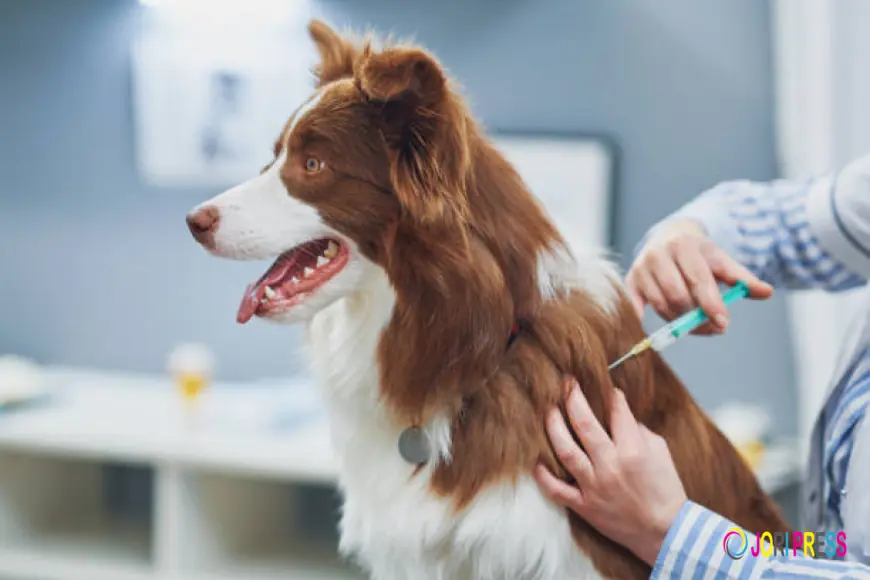Everything You Need to Know About Dog Vaccinations and Why They Matter
Discover everything you need to know about dog vaccinations — from essential shots and schedules to their benefits and aftercare. Keep your dog healthy, protected, and disease-free for life.

Keeping your dog healthy and protected from diseases is one of the most important responsibilities of being a pet parent. Regular dog vaccinations essential to prevent life-threatening illnesses and to ensure your furry companion enjoys a long, happy, and active life.
Many new pet owners often wonder which vaccines their dog actually needs, how often to get them, and why they’re so important. In this guide, we’ll cover everything you need to know about dog vaccinations, including their types, schedule, benefits, and what to expect during and after vaccination.
Why Dog Vaccinations Are So Important
Vaccines work by stimulating your dog’s immune system to produce antibodies against specific diseases. If your dog ever comes into contact with those viruses or bacteria in the future, their immune system will recognize and fight them off quickly.
Without proper dog vaccinations, even a simple exposure—like a walk in the park or playing with another pet—can lead to serious illnesses such as rabies, parvovirus, or distemper. Vaccinations not only protect your dog but also reduce the spread of contagious diseases among other animals and humans.
How Dog Vaccinations Work
When a vaccine is administered, it introduces a harmless form of the virus or bacteria into your dog’s system. This triggers an immune response without causing the disease itself. The body then “remembers” how to fight that infection if exposed again later in life.
Just like humans, dogs need certain core vaccines to prevent deadly diseases and may require additional non-core vaccines depending on their lifestyle, breed, or environment.
Core and Non-Core Dog Vaccinations
Dog vaccinations are divided into two main categories: core and non-core.
Core Vaccinations
Core vaccines are essential for all dogs, regardless of age, location, or lifestyle. These protect against highly contagious and potentially fatal diseases. They include:
-
Rabies: A viral disease that affects the nervous system and is fatal once symptoms appear. Required by law in most areas.
-
Canine Parvovirus (CPV): A severe, often deadly virus causing vomiting, diarrhea, and dehydration, especially in puppies.
-
Canine Distemper Virus (CDV): Affects the respiratory, gastrointestinal, and nervous systems; highly contagious.
-
Canine Adenovirus (CAV-2): Protects against infectious canine hepatitis and respiratory infections.
Non-Core Vaccinations
Non-core vaccines are optional and depend on your dog’s environment, travel, and exposure risks. Discuss these with your vet to decide which ones are appropriate.
-
Leptospirosis: Spread through contaminated water or soil; can also infect humans.
-
Bordetella bronchiseptica: Commonly known as kennel cough, often required for boarding or grooming facilities.
-
Lyme Disease: Transmitted by ticks; recommended if you live in or travel to areas where ticks are common.
-
Canine Influenza: Helps protect against respiratory infections in social or urban settings.
Puppy Vaccination Schedule
Puppies are especially vulnerable to infections, so early and timely vaccination is crucial. Here’s a general vaccination schedule most vets recommend:
| Age | Vaccinations |
|---|---|
| 6–8 weeks | Distemper, Parvovirus (first dose) |
| 10–12 weeks | DHPP booster (Distemper, Hepatitis, Parainfluenza, Parvovirus) |
| 14–16 weeks | DHPP final booster + Rabies |
| 12–16 months | Annual boosters for core vaccines |
| Annually or as advised | Non-core vaccines (Leptospirosis, Bordetella, Lyme, Influenza) |
Always consult your veterinarian for a personalized plan, as vaccine requirements can vary based on your dog’s breed, health condition, and location.
Adult Dog Vaccination Schedule
Adult dogs also need regular booster shots to maintain immunity. Core vaccines are usually given every 1 to 3 years, depending on the vaccine type and your vet’s advice. Some non-core vaccines may require yearly updates. Keeping a vaccination record ensures your dog stays protected throughout life.
What to Expect After Dog Vaccinations
After receiving dog vaccinations, your dog may experience mild side effects — this is completely normal. Common reactions include:
-
Slight swelling or soreness at the injection site
-
Fatigue or reduced appetite for a day
-
Mild fever or sleepiness
These symptoms usually resolve within 24–48 hours. However, if your dog experiences persistent vomiting, swelling of the face, breathing difficulty, or extreme lethargy, contact your vet immediately — these could be signs of an allergic reaction.
Tips for a Smooth Vaccination Experience
-
Schedule vaccines on a calm day: Avoid heavy exercise or grooming right after vaccination.
-
Keep your dog hydrated and rested: Fresh water and quiet rest help their body recover quickly.
-
Watch for side effects: Monitor for unusual behavior and inform your vet if anything seems off.
-
Maintain vaccination records: Keeping a log helps track booster due dates and is required for travel, boarding, or daycare.
-
Discuss lifestyle with your vet: Share if your dog frequently visits parks, kennels, or travels — this helps tailor the vaccination plan.
Common Myths About Dog Vaccinations
Myth 1: Older dogs don’t need vaccines.
Fact: Adult dogs still require booster shots to maintain immunity.
Myth 2: Indoor dogs are safe without vaccines.
Fact: Even indoor dogs can be exposed to diseases through humans, other pets, or contaminated surfaces.
Myth 3: Vaccines cause illness.
Fact: Modern vaccines are safe and carefully tested. Mild side effects are temporary and far less dangerous than the diseases they prevent.
The Cost of Dog Vaccinations
The cost of dog vaccinations can vary depending on the clinic, location, and the vaccines needed. Basic core vaccines are typically affordable, while additional non-core vaccines may cost slightly more. Many pet clinics offer vaccination packages that cover all essential shots for puppies or adults, which can save money in the long run.
Final Thoughts
Dog vaccinations are one of the simplest and most effective ways to safeguard your pet’s health. They protect your dog from severe diseases, prevent costly treatments, and help maintain a healthy environment for all pets and people.
Make sure to consult your vet about the right vaccination schedule and never skip booster doses. A few minutes at the vet’s clinic can add years of good health and happiness to your dog’s life.
What's Your Reaction?
 Like
0
Like
0
 Dislike
0
Dislike
0
 Love
0
Love
0
 Funny
0
Funny
0
 Angry
0
Angry
0
 Sad
0
Sad
0
 Wow
0
Wow
0















































